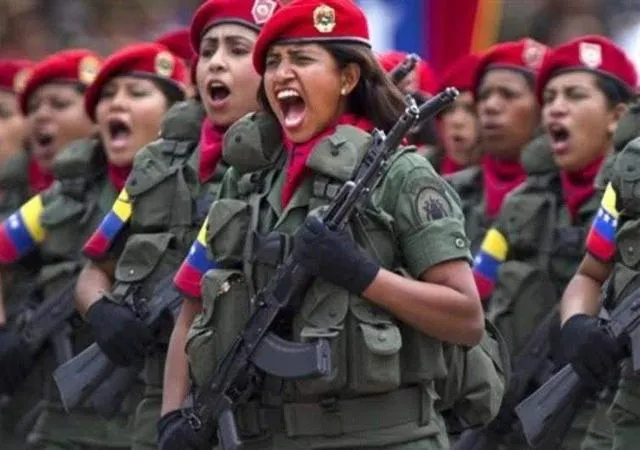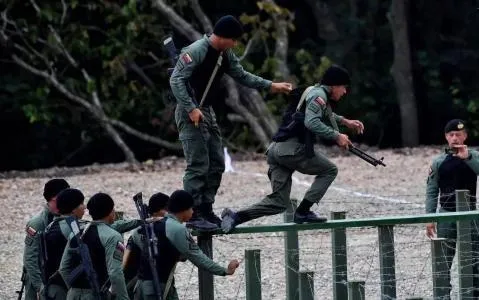
With Venezuela's domestic situation becoming increasingly tense, the risk of war is increasing. With the support of the United States and other Western countries, the protest movement of Venezuelan opposition forces is growing, and the signs of launching a military coup have become increasingly prominent. Just then it was reported that the Venezuelan border had really fought, and caused more serious casualties.
On February 22, CNN quoted the Associated Press as saying that on the second day after Venezuela's president ordered the closure of its border with Brazil, a clash broke out in Venezuela's border with Brazil, and members of Venezuela's Permon ethnic group fought with the country's security forces and army. Venezuelan soldiers and policemen on duty were forced to shoot, rubber bullets and tear gas were fired at members of the Permons, resulting in the shooting of a woman and the injury of more than 10 others. The Associated Press also reported that the Venezuelan army is currently mobilizing tanks to the Venezuelan-Pakistani border to reinforce the forces blocking and controlling the border.
Venezuela is now about to become a powder keg in Central America, and the United States has been supporting Guaido in accumulating strength for the leader's opposition forces in preparation for a military coup. The border conflict between Venezuela and Pakistan just spread out has its inevitable side. It can be said that Venezuela's civil strife has become more and more likely to escalate into a large-scale civil war. In a single round, Maduro ordered the closure of the border to prevent the United States from delivering politically motivated aid to Venezuela through Brazil, but the opposition encouraged members of the Permons to start clashes with the government police, who were forced to shoot.

Freezing three feet is not a day's cold. There is a reason why Venezuela's situation has developed so rapidly. The United States had long plundered Venezuela's oil interests under the banner of joint development of oil resources, but the governments of Chavez and Maduro would try to limit the interests of American companies. As a result, the Maduro government has become an urgent target of subversion in the United States. In fact, a few years ago there was news that the United States was trying to provoke a mutiny in Venezuela.
After Maduro was re-elected as Venezuelan President in May last year, the United States put the collapse of Maduro on an important agenda. Last year alone, it was repeatedly reported that US intelligence infiltrated Venezuela to plot a military coup with the country's opposition. Even in early August last year, an assassination operation was carried out against Maduro, which was bankrupt because of Maduro's strict precautions. But then the United States and the United States-led organizations of American States all voiced their support for the formation of a "provisional government" by Guaido, the Venezuelan opposition leader who had exiled in the United States, instead of acknowledging the Maduro government.
At the beginning of this year, with the secret support of the United States, Venezuela's small-scale "mutiny" began to emerge. On 19 January, 40 members of the Venezuelan security corps rebelled, but were immediately suppressed and all the rebels were arrested. However, this did not stop Guaido's progress towards complete secession. A few days later, on 23 January, Guaido finally raised the banner of "another central government" and declared himself "interim president" of Venezuela. Since then, separatism in Venezuela has formally formed a camp.
After Guaido announced the establishment of another "provisional government", both opposition forces in Venezuela were gathered and large-scale insurgency activities were speeding up; at the same time, the intervention of the United States and its allies was more active, and a number of countries in the Americas and Europe expressed their support for Guaido's "interim president". This naturally gives the United States more confidence in its military intervention. On the 24th, Trump declared that "military measures against Venezuela should not be excluded". Since then, the United States has repeatedly released signals to use force against the Maduro government.
After the announcement of sanctions against the Maduro government at the end of January, the news that the United States provided weapons to the Guaido government has also been heard since the beginning of February. On 7 February, it emerged that the Maduro government seized a batch of light weapons in support of the opposition at the airport; recently, the United States has made so-called "humanitarian assistance" to Venezuela. The movement followed. It should be noted that the nature of such assistance has long been recognized by the Maduro Government and the United Nations, and it is clear that such a "political show" will only exacerbate Venezuela's civil strife. Therefore, as mentioned above, Maduro had to order the closure of the border with Brazil, Colombia and other countries.
Now the United States must let these "aid" in with ulterior intentions, and Guaido's "interim government" naturally supports it; but the Maduro government is mobilizing military and police forces to prevent such ulterior aid from entering the country. So the conflict had to happen. Of course, this bloody conflict is likely to be the spark that ignites Venezuela's "powder keg".